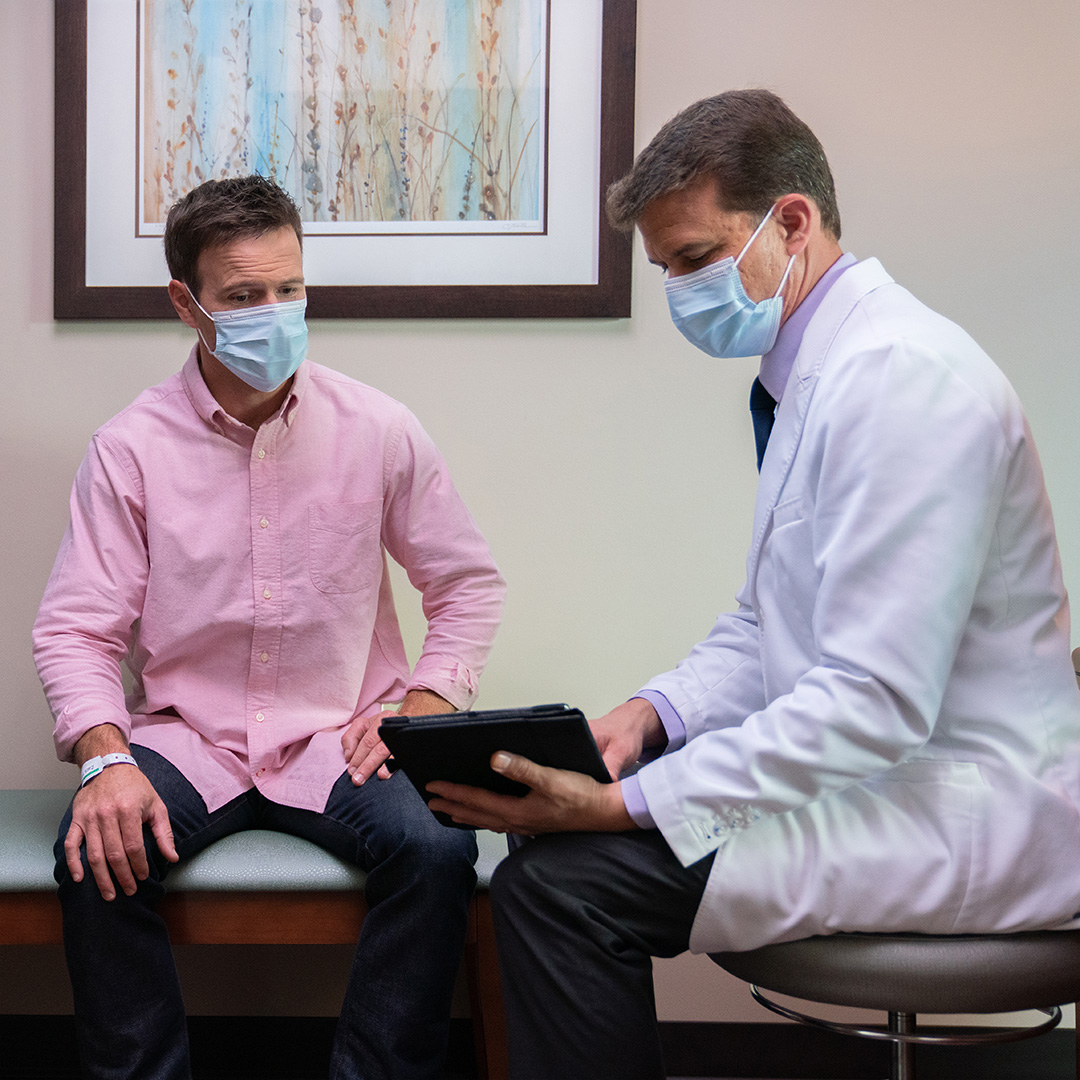


The clinicians with the Gastrointestinal (GI) Cancer Center at City of Hope Chicago are committed to offering state-of-the-art diagnostic tools and treatments options for patients with gastrointestinal cancer.
Our multidisciplinary team of board-certified medical oncologists, surgical oncologists, radiation oncologists and gastroenterologists work together with our supportive care providers and each patient to deliver quality clinical care with a patient-centered approach.
Our GI Cancer Center treats all gastrointestinal-related cancers, including anal, colon, esophageal, liver, pancreatic and stomach cancers, as well as neuroendocrine tumors.
We also diagnose, stage and treat precancerous conditions such as Barrett’s esophagus, a risk factor for esophageal cancer, as well as lung or breast cancers that have metastasized (or spread) to the gastrointestinal system.
After your diagnosis is confirmed, our GI Cancer Center care team will discuss your options with you and help you develop a personalized care plan tailored to your individual needs.
Our doctors are trained and experienced in treating the wide range of gastrointestinal diseases. Diagnostic tools and treatments options for most gastrointestinal diseases include the following, either alone or in combination:
For patients with advanced colorectal, stomach or appendix cancer, surgery to reduce the size of a tumor may be recommended in combination with hyperthermic intraperitoneal chemotherapy (HIPEC), a highly concentrated, heated chemotherapy treatment delivered directly to the abdominal cavity during surgery.
Within the GI Cancer Center, the gastroenterology team offers patients a number of minimally invasive techniques to diagnose and treat tumors and help reduce cancer-related symptoms. The team combines diagnostic test and state-of-the-art technologies with non-surgical techniques, such as colonoscopy to examine the inner lining of the colon and rectum, and endoscopic mucosal resection to remove abnormal tissue. The team also uses endoscopic ultrasound with fine-needle biopsy and radiofrequency ablation and other tools to treat esophageal, pancreatic, colorectal and bile duct cancers.
The gastroenterologists with the GI Cancer Program at City of Hope Chicago, are armed with an advanced diagnostic tool called GI Genius™, which uses artificial intelligence (AI) technology to help doctors more clearly and quickly identify colon polyps, adenomas and cancerous or pre-cancerous lesions.
In assisting the physician conducting the examination, GI Genius highlights areas of the colon that may look suspicious, including spots doctors may have missed, prompting them to take a closer look. A clinical trial that compared colonoscopy results with and without the device found that using GI Genius “significantly increases” the detection rate of adenomas during a colonoscopy.
GI Genius was the first AI device approved by the U.S. Food and Drug Administration for use during a colonoscopy.

“GI Genius has helped me identify polyps in the colon that otherwise may have been missed. Taking these polyps out helps prevent the development of colon cancer in our patients.”
Our Chicago gastroenterology team has deep training and expertise using hepatic artery infusion (HAI) therapy, which may be an option for patients with certain colorectal cancers that have spread to the liver, or those with bile duct cancer confined to the liver (intrahepatic cholangiocarcinoma).
The care team implants the HAI pump just below the skin in the abdomen to deliver high concentrations of a drug directly to tumors in the liver with the aim of destroying cancer cells while limiting potential side effects elsewhere in the body. The device is approved by the U.S. Food and Drug Administration, and clinical trials have shown that it may improve overall survival in patients with certain advanced cancers.
 Pankaj Vashi, M.D., A.G.A.F., F.A.S.P.E.N.
Gastroenterologist
Pankaj Vashi, M.D., A.G.A.F., F.A.S.P.E.N.
Gastroenterologist
 Evan Pisick, M.D.
Medical Oncologist
Evan Pisick, M.D.
Medical Oncologist
 Hatem Halabi, M.D., F.A.C.S.
Surgical Oncologist
Hatem Halabi, M.D., F.A.C.S.
Surgical Oncologist
 Elham Abboud, M.D.
Pathologist, City of Hope Chicago
Elham Abboud, M.D.
Pathologist, City of Hope Chicago
 Edward Kaplan, M.D.
Medical Oncologist and Director of Gastrointestinal Malignancies, North Shore
Edward Kaplan, M.D.
Medical Oncologist and Director of Gastrointestinal Malignancies, North Shore
 Mani Mahdavian, M.D.
Interventional Gastroenterologist, City of Hope Chicago
Mani Mahdavian, M.D.
Interventional Gastroenterologist, City of Hope Chicago
 Karen Smorowski, M.D.
Radiation Oncologist, City of Hope Chicago
Karen Smorowski, M.D.
Radiation Oncologist, City of Hope Chicago
 Bradford Tan, M.D.
Medical Director, Pathology & Laboratory Medicine
Bradford Tan, M.D.
Medical Director, Pathology & Laboratory Medicine
 Kenny S. Yoo, MD
Interventional Radiologist, City of Hope Chicago
Kenny S. Yoo, MD
Interventional Radiologist, City of Hope Chicago
 Shen Li, M.D.
Surgical Oncologist
Shen Li, M.D.
Surgical Oncologist
The GI Cancer Center team at City of Hope Chicago is committed to a multidisciplinary approach to care. After diagnosis, each patient is evaluated by a medical oncologist, who then builds the appropriate team based on the patient’s needs. Then the entire team, along with the patient, works together to develop a treatment plan designed to specifically for the patient. Throughout treatment and follow up, the team meets regularly to ensure that everyone is in alignment with the needs of the patient.
This collaborative, personalized approach allows us flexibility along the treatment journey, while also fostering an environment where experts in a variety of disciplines work together, all under one roof. New options may arise or different goals may be proposed during the course of treatment. We monitor the patient throughout treatment and adjust the care plan as needed.
As a patient at the GI Cancer Center, your team also works closely with other supportive care providers to help manage additional disease- and treatment-related side effects, such as nausea and vomiting. These supportive services may include a pain management physician, as well as naturopathic, mind-body and spiritual support providers.
Because of the digestive tract’s role in processing food and waste, many patients with gastrointestinal disease have difficulty with digestive function. That’s why nutritional support is a key component of the GI Cancer Center’s approach. The center has a dedicated clinical dietitian on staff to work with patients in developing a healthy, balanced and appetizing nutrition plan. If patients become malnourished, our dietitian is also available to help them establish healthy lifestyle and eating habits to help improve their condition.
Learn more about the value of integrated cancer care

" My wife and family supported me through this hard time, and with their care along with the care provided by City of Hope, I can now be here for them. I am so thankful God led us there!"
Our oncologists are committed to improving treatment options for gastrointestinal cancer patients. As part of that commitment, the GI Cancer Center offers qualified patients carefully selected clinical trials in studying new treatment approaches like immunotherapy for pancreatic cancer and other innovative research.
Although clinical trials are not available to all patients, they may offer some patients options that would otherwise be unavailable to them. Your care team will discuss whether you qualify for any of our ongoing clinical trials, and if so, help you enroll.
Learn more about the City of Hope clinical trials program and which trials are available
For general questions, contact an Oncology Information Specialist at 888-841-9129.
New patients: (888) 994-1029
Existing patients: (847) 510-2822
New patients: (888) 994-1029
Existing patients: (312) 477-2400
All patients: (847) 675-3900
Offering clinical trials on new and emerging cancer treatment options.
View our clinical trials